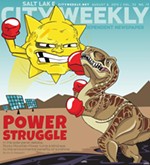Meat and Greet
There are those, I’m certain, who heard about Eric Schlosser’s 2002 non-fiction book Fast Food Nation and decided based solely on the title that they would have nothing to do with it. In all likelihood, these were people who expected the investigative piece to be an anti-meat polemic—and heaven forbid that anyone in America should expose himself to ideas he’s already convinced are wrong.
What those sight-unseen haters missed was in fact a deeply humanistic piece of writing, one that showed as much respect for franchise restaurant pioneers like Ray Kroc and Carl Karcher as it did for family ranchers watching corporate agribusiness destroy their way of life. Fast Food Nation was a far more natural candidate for translation to fictional narrative than you might expect, since at its core it was a “people story.�
Richard Linklater, conveniently enough, is a people storyteller, yet there’s a level on which Linklater’s sensibility and Schlosser’s never quite seem to synch up in Fast Food Nation. For Schlosser, shooting the bull is an industrial paradigm; for Linklater, it’s a conversational one. And the film often finds itself at an awkward intersection between theoretical musings and concrete political urgency.
Most of the film’s events take place in and around a nondescript Colorado suburb that is home to a massive meat-packing operation. Don Henderson (Greg Kinnear), a marketing executive for the fictional Mickey’s fast food chain, is sent to look into potentially damaging reports of high E. coli counts in the restaurant’s burgers. Henderson gets a special tour of the plant, but he doesn’t learn about illegal immigrant workers like married couple Raul (Wilmer Valderrama) and Sylvia (Catalina Sandino Moreno) who risk their lives for low pay. Nor does he understand the life of a student like Amber (Ashley Johnson) whose minimum wage job at a Mickey’s restaurant collides with the social consciousness promoted by her bohemian uncle (Linklater stalwart Ethan Hawke).
Fast Food Nation meanders back and forth between its various narrative threads, pausing occasionally for characters to exchange philosophical ideas about the impact of fast food on our culture. Many of these involve Kinnear’s Don, who exchanges pleasantries with a representative of the meat supplier (Bruce Willis) and an old-school rancher (Kris Kristofferson); Amber and her uncle similarly chat about the value of taking a revolutionary stand. This is the world of Richard Linklater as we have come to know it from films like Slacker, Before Sunrise and Waking Life, one where hyper-articulate dialogue drives the scenes. If late-night dormitory musings are your idea of a good time, Linklater’s more than happy to oblige you.
But Fast Food Nation also aims for immediacy when it spends time with the Mexican factory workers. Linklater abruptly turns into Ken Loach as he prowls through these scenes of the exploited underclass. Coyotes lead the immigrants on their dangerous trek across the desert; a predatory supervisor (Bobby Canavale) uses female workers for his pleasure; management weasels out of its health care obligations. The strong performances add to the impact of these scenes, but the truth is that they’re pretty much the only scenes in the film that involve concrete impacts and lives being lived, rather than talked about.
And it’s frustrating watching Fast Food Nation wander in search of powerful stories, when there are so many more potentially powerful stories to tell related to this issue. Why not the story of a family watching a child suffer from the effects of E. coli poisoning? Why not the tragic tale of the real-life inspiration for Kristofferson’s nigh-obsolete family rancher? Or the disgruntled Mickey’s employee (Paul Dano) actually following through on his threat to hold up his own restaurant, as so many actual fast food workers have? It’s fairly inexcusable to take such raw material and turn it into something that’s so often so purely abstract.
The potent final scenes of Fast Food Nation—viewer beware, they’re pretty graphic—are bound to leave some viewers with the impression that they’ve experienced something as visceral as the stuff that flows down the meat-packing conveyor belts. Yet they’ve only seen one of the few occasions where Schlosser’s almost tactile journalism leapfrogs Linklater’s casual fictions. In macrocosm, it emerges as a “people story� only in the broadest sense. What a strange decision to make a Fast Food Nation movie in which the stuff that comes out of people’s mouths gets so much more attention than the stuff that goes in.
FAST FOOD NATION
**1/2 (two and a half stars out of four)
Starring: Greg Kinnear, Ashley Johnson, Catalina Sandino Moreno.
Directed by Richard Linklater
Rated R.



